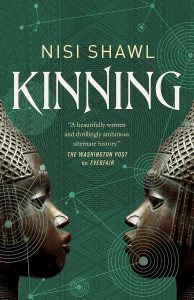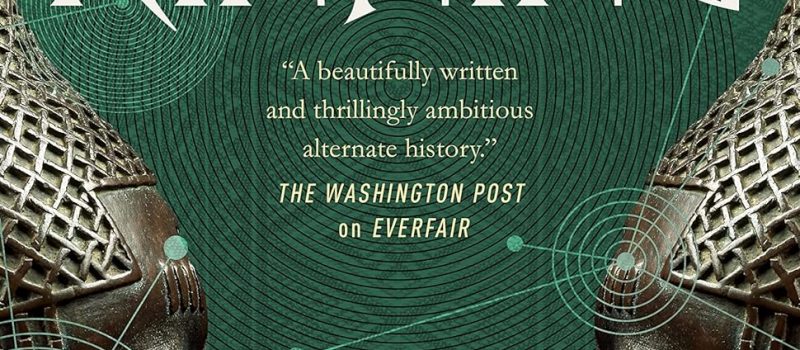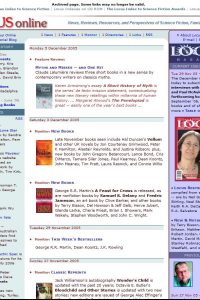Gary K. Wolfe Reviews Kinning by Nisi Shawl
 Kinning, Nisi Shawl (Tor 978-1-25021-269-6, $28.99, 432pp, hc) January 2024.
Kinning, Nisi Shawl (Tor 978-1-25021-269-6, $28.99, 432pp, hc) January 2024.
Nisi Shawl’s 2016 Everfair was one of the more provocative alternate histories of the past decade, with its steampunk Africa giving birth to a safe-haven country called Everfair, carved out of the oppressively brutal Belgian Congo of King Leopold and financed in part by British socialists and African-American missionaries. It was a sprawling, ambitious narrative, covering some 30 years from 1889 to 1919 over several countries and continents and featuring a huge cast of characters. While its sequel, Kinning, does follow up on the geopolitical themes of the earlier novel, it’s a much more tightly constructed narrative, set almost entirely in 1921 and focusing largely on a handful of major characters and their shifting relationships. Among these are Bee-Lung, a pharmacist aboard the dirigible-like ‘‘aircanoe’’ Xu Mu; her younger brother Tink, a brilliant engineer; Prince Ilunga and Princess Mwadi, vying to succeed their father King Mwenda, who has announced his plans to abdicate as Everfair’s ruler; and Severia, Gopal, and Rima Bailey, all of whom are involved to some degree in Severia’s efforts to make a utopian film called The Sleeper Wakes, which seems to borrow its title and basic conceit (but not much else) from H.G. Wells. Meanwhile, much of Europe has been devastated by something called the Maltese Influenza, which seems to revive old colonialist impulses. Everfair continues to deal with such threats, mostly from England and Italy, whose plans include a massive geoengineering project called Atlantropa, which seeks to turn part of the Mediterranean into habitable land – and which would essentially drown most of Everfair. Needless to say, this aspect of the story is rife with spies, shady diplomats, and assassins, but it’s not quite the central focus of the novel.
That focus, it turns out, is empathy. Much of what Bee-Lung and Tink are up to aboard the Xu Mu involves promoting the worldwide spread of something called Spirit Medicine, developed from a fungus by a doctor and ‘‘capable of binding humans to one another in new ways,’’ largely by forming small close-knit affinity groups called kinnings or cores, whose members develop extraordinary sensitivity to one another bordering on psychic powers. Later, we’ll learn that Spirit Medicine may even enable certain bonds with birds and animals, but it’s initially viewed in sociopolitical rather than mystical terms. Its early advocates saw it as a kind of vaccine against capitalism and greed, a nonviolent alternative to the failed revolutionary movements such as Russia’s Bolsheviks. It becomes widespread enough that kinnings in various cities and towns lead to an insurgent uprising that comes to be called the May 4 Move ment. There are some unusual side effects to the medicine, including increased sexual desire, but these are trivial compared to the weird side effects of a ‘‘Russian cure’’ developed to counteract the Spirit Medicine – which include, apparently, an irresistible impulse to become a tree.
Notions of induced empathy or empathy-bonded groups aren’t entirely new in SF – we can see them in writers as diverse as Theodore Sturgeon (who called them homo gestalt), Octavia E. Butler, and Joe Haldeman – but they aren’t that common, either, and Shawl’s strategy for exploring them is to focus on how they affect specific characters, and how these effects change and strengthen over time. This lends Kinning a more intimate feeling than Everfair, and is more dependent on our own empathetic understanding of Shawl’s characters, from the arrogant Prince Ilunga to the practical-minded Bee-Lung and – one of my own favorites, the tough-minded and blunt-spoken American actor Rima Bailey. Even a hyperactive monkey named Raffles, initially a kind of comic relief, eventually emerges as a character and briefly gets a point of view. The vast panorama of Everfair may be largely relegated to the background, and the steampunk tech dialed back a few notches, but it would certainly be a hoot to spend some time aboard that spectacular aircanoe with these intriguing, complex, and rapidly evolving characters. It’s a rare sequel that says something entirely new, while deepening the central themes of the original.
Gary K. Wolfe is Emeritus Professor of Humanities at Roosevelt University and a reviewer for Locus magazine since 1991. His reviews have been collected in Soundings (BSFA Award 2006; Hugo nominee), Bearings (Hugo nominee 2011), and Sightings (2011), and his Evaporating Genres: Essays on Fantastic Literature (Wesleyan) received the Locus Award in 2012. Earlier books include The Known and the Unknown: The Iconography of Science Fiction (Eaton Award, 1981), Harlan Ellison: The Edge of Forever (with Ellen Weil, 2002), and David Lindsay (1982). For the Library of America, he edited American Science Fiction: Nine Classic Novels of the 1950s in 2012, with a similar set for the 1960s forthcoming. He has received the Pilgrim Award from the Science Fiction Research Association, the Distinguished Scholarship Award from the International Association for the Fantastic in the Arts, and a Special World Fantasy Award for criticism. His 24-lecture series How Great Science Fiction Works appeared from The Great Courses in 2016. He has received six Hugo nominations, two for his reviews collections and four for The Coode Street Podcast, which he has co-hosted with Jonathan Strahan for more than 300 episodes. He lives in Chicago.
This review and more like it in the December and January 2023 issue of Locus.
 While you are here, please take a moment to support Locus with a one-time or recurring donation. We rely on reader donations to keep the magazine and site going, and would like to keep the site paywall free, but WE NEED YOUR FINANCIAL SUPPORT to continue quality coverage of the science fiction and fantasy field.
While you are here, please take a moment to support Locus with a one-time or recurring donation. We rely on reader donations to keep the magazine and site going, and would like to keep the site paywall free, but WE NEED YOUR FINANCIAL SUPPORT to continue quality coverage of the science fiction and fantasy field.
©Locus Magazine. Copyrighted material may not be republished without permission of LSFF.







